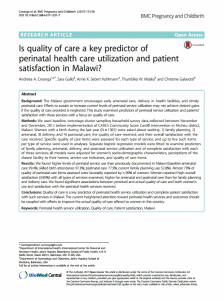
Background
The Malawi government encourages early antenatal care, delivery in health facilities, and timely postnatal care. Efforts to sustain or increase current levels of perinatal service utilization may not achieve desired gains if the quality of care provided is neglected. This study examined predictors of perinatal service utilization and patients’ satisfaction with these services with a focus on quality of care.
Methods
We used baseline, two-stage cluster sampling household survey data collected between November and December, 2012 before implementation of CARE’s Community Score Card© intervention in Ntcheu district, Malawi. Women with a birth during the last year (N = 1301) were asked about seeking: 1) family planning, 2) antenatal, 3) delivery, and 4) postnatal care; the quality of care received; and their overall satisfaction with the care received. Specific quality of care items were assessed for each type of service, and up to five such items per type of service were used in analyses. Separate logistic regression models were fitted to examine predictors of family planning, antenatal, delivery, and postnatal service utilization and of complete satisfaction with each of these services; all models were adjusted for women’s socio-demographic characteristics, perceptions of the closest facility to their homes, service use indicators, and quality of care items.
Results
We found higher levels of perinatal service use than previously documented in Malawi (baseline antenatal care 99.4%; skilled birth attendance 97.3%; postnatal care 77.5%; current family planning use 52.8%). Almost 73% of quality of perinatal care items assessed were favorably reported by > 90% of women. Women reported high overall satisfaction (≥85%) with all types of services examined, higher for antenatal and postnatal care than for family planning and delivery care. We found significant associations between perceived and actual quality of care and both women’s use and satisfaction with the perinatal health services received.
Conclusions
Quality of care is a key predictor of perinatal health service utilization and complete patient satisfaction with such services in Malawi. The current heightened attention toward perinatal health services and outcomes should be coupled with efforts to improve the actual quality of care offered to women in this country.